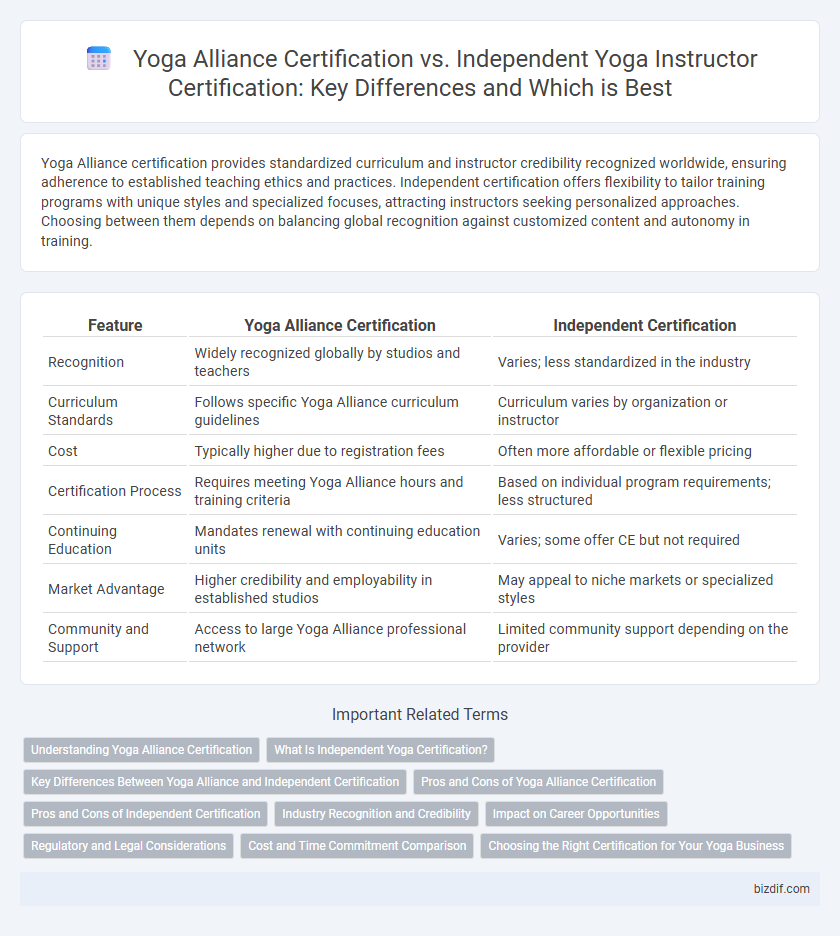Yoga Alliance certification provides standardized curriculum and instructor credibility recognized worldwide, ensuring adherence to established teaching ethics and practices. Independent certification offers flexibility to tailor training programs with unique styles and specialized focuses, attracting instructors seeking personalized approaches. Choosing between them depends on balancing global recognition against customized content and autonomy in training.
Table of Comparison
| Feature | Yoga Alliance Certification | Independent Certification |
|---|---|---|
| Recognition | Widely recognized globally by studios and teachers | Varies; less standardized in the industry |
| Curriculum Standards | Follows specific Yoga Alliance curriculum guidelines | Curriculum varies by organization or instructor |
| Cost | Typically higher due to registration fees | Often more affordable or flexible pricing |
| Certification Process | Requires meeting Yoga Alliance hours and training criteria | Based on individual program requirements; less structured |
| Continuing Education | Mandates renewal with continuing education units | Varies; some offer CE but not required |
| Market Advantage | Higher credibility and employability in established studios | May appeal to niche markets or specialized styles |
| Community and Support | Access to large Yoga Alliance professional network | Limited community support depending on the provider |
Understanding Yoga Alliance Certification
Yoga Alliance Certification is widely recognized within the international yoga community, serving as a benchmark for yoga instructor training programs that meet standardized curriculum and ethical guidelines. Independent certification programs may offer specialized or flexible training, but they often lack the universal recognition and networking opportunities provided by Yoga Alliance. Understanding the requirements for Yoga Alliance certification, including a minimum number of training hours and adherence to their standards, helps instructors ensure credibility and professional growth in the global yoga industry.
What Is Independent Yoga Certification?
Independent yoga certification refers to credentials offered by organizations outside the Yoga Alliance standards, often tailored to specific styles or teaching philosophies. These programs may provide more flexible training hours, diverse curriculum focuses, and unique specialty courses compared to the traditional Yoga Alliance 200 or 500-hour certifications. Choosing independent certification can enhance a teacher's expertise in niche areas and appeal to students seeking specialized yoga instruction.
Key Differences Between Yoga Alliance and Independent Certification
Yoga Alliance certification provides a standardized curriculum with internationally recognized credentials and access to a global network of registered yoga schools, ensuring credibility and consistent teaching standards. Independent certification offers flexibility in training content, duration, and teaching style, appealing to instructors seeking personalized or niche specialization without strict adherence to Yoga Alliance guidelines. Key differences include accreditation recognition, community support, cost, and curriculum structure, impacting career opportunities and professional development pathways for yoga teachers.
Pros and Cons of Yoga Alliance Certification
Yoga Alliance certification provides global recognition and a standardized curriculum that can enhance an instructor's credibility and job prospects. However, it may involve higher costs and adherence to specific guidelines that limit curriculum flexibility compared to independent certification programs. Independent certifications often allow for more personalized training styles and innovative approaches but might lack the widespread acceptance and network benefits offered by Yoga Alliance.
Pros and Cons of Independent Certification
Independent yoga certification offers greater flexibility in curriculum design, allowing instructors to tailor training programs to specific styles and student needs, which can enhance personalized teaching quality. It may provide cost savings and faster certification processes compared to Yoga Alliance, but lacks the widespread recognition and standardized credibility that comes with Yoga Alliance registration. Some employers and studios prefer Yoga Alliance-certified instructors, making independent certification potentially less advantageous for career opportunities in established yoga communities.
Industry Recognition and Credibility
Yoga Alliance certification holds widespread industry recognition, making it a trusted benchmark for yoga instructors worldwide. Independent certifications can offer specialized or unique training but may lack the universal credibility that Yoga Alliance membership provides. Employers and studios often favor Yoga Alliance credentials due to their established standards and global acceptance.
Impact on Career Opportunities
Yoga Alliance certification is widely recognized globally, enhancing credibility and increasing job prospects in established studios and wellness centers due to industry-standard training requirements. Independent certification programs may offer specialized or niche training but often lack the universal recognition that employers seek, potentially limiting career opportunities. Choosing Yoga Alliance certification can lead to broader professional networks and greater access to international teaching platforms.
Regulatory and Legal Considerations
Yoga Alliance certification is widely recognized and provides a standardized credential that can facilitate legal compliance and professional credibility in many regions. Independent certification may offer specialized training but often lacks universal regulatory recognition, potentially complicating insurance claims, business licensing, or employment opportunities. Understanding local laws and ensuring certification meets regional legal standards is essential for practicing yoga professionally and avoiding liability.
Cost and Time Commitment Comparison
Yoga Alliance certification typically involves a substantial investment ranging from $3,000 to $5,000 for a 200-hour training program, requiring a commitment of several weeks or months of in-person or online classes. Independent certification programs often offer more flexible schedules and lower costs, sometimes under $1,500, allowing students to complete training at their own pace with fewer in-person requirements. Choosing between the two depends on budget constraints and availability, with Yoga Alliance providing recognized credibility and independent courses offering economical and time-efficient alternatives.
Choosing the Right Certification for Your Yoga Business
Selecting the right yoga certification significantly impacts your business credibility and client trust, with Yoga Alliance certification offering widespread recognition and a large professional network. Independent certifications often provide specialized training and flexibility in teaching styles but may lack the universal acceptance that Yoga Alliance provides. Evaluating your target market and long-term career goals helps determine whether the standardized credibility of Yoga Alliance or the niche expertise of independent certification aligns better with your yoga business strategy.
Yoga alliance certification vs independent certification Infographic

 bizdif.com
bizdif.com